Macquarie University Contracts: Procurement and Contracts Law Analysis
VerifiedAdded on 2023/01/23
|8
|2096
|53
Case Study
AI Summary
This case study examines four transactions involving the Nulla Nulla Shire Council and various external parties, focusing on procurement and contract law principles. The first transaction explores whether Ace Cleaning Services can sue the council for breach of contract, analyzing offer, acceptance, and consideration. The second transaction assesses if a binding contract exists between the council and Boolaroo Buses Pty Ltd, considering oral contracts and good faith. The third transaction investigates the council's liability for losses incurred by Crop-Pro Company due to actions by a council officer, evaluating good faith and fair dealing. The fourth transaction determines if Duplo Builders can sue the council for breach of contract, considering an undertaking made by a council manager. The analysis applies legal principles to determine if contracts were formed, if breaches occurred, and the council's liability in each scenario. The conclusion emphasizes that council officers can bind the council if they act in the course of their duty and in the best interest of the council, making the council liable for any losses arising from these actions.
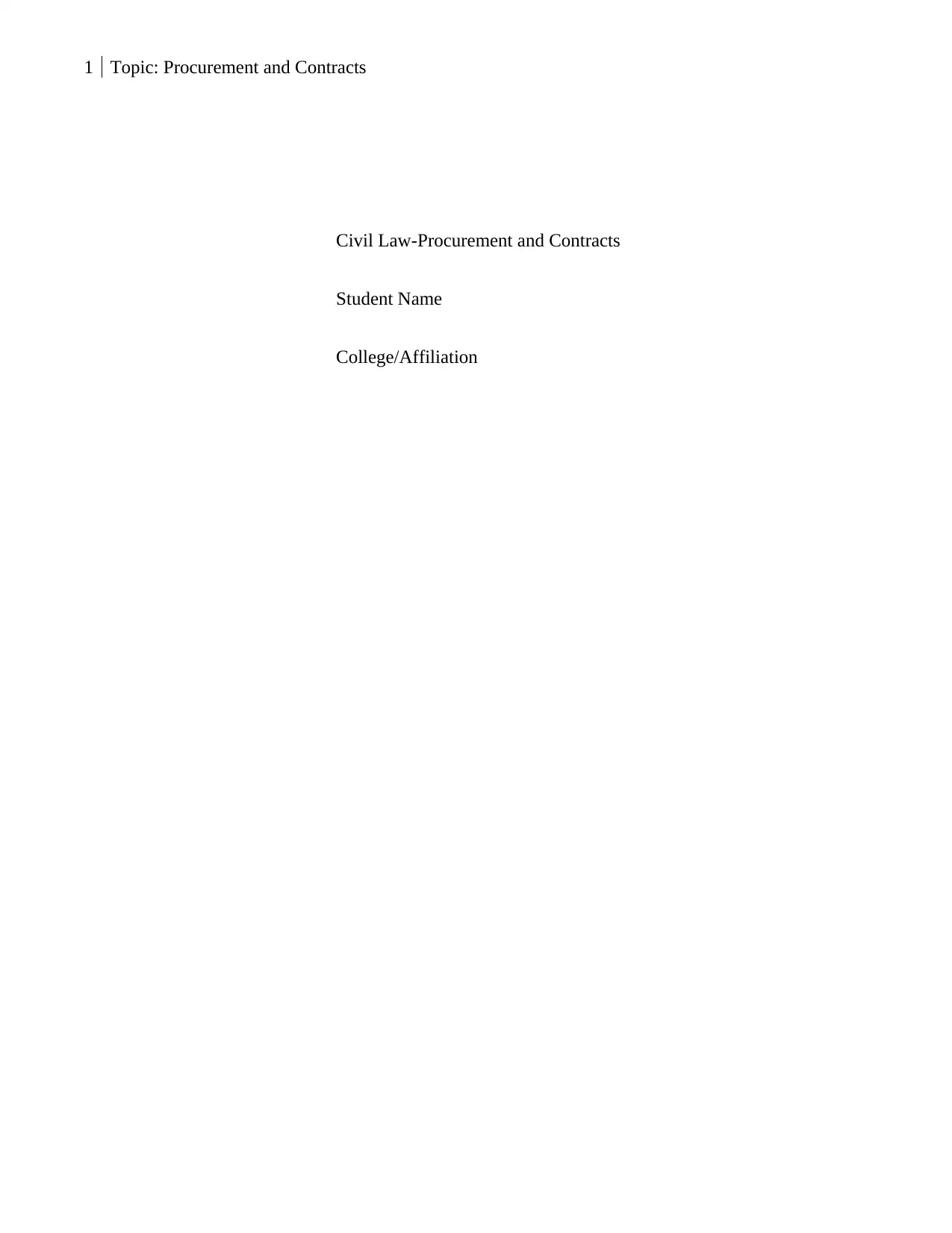
1 Topic: Procurement and Contracts
Civil Law-Procurement and Contracts
Student Name
College/Affiliation
Civil Law-Procurement and Contracts
Student Name
College/Affiliation
Paraphrase This Document
Need a fresh take? Get an instant paraphrase of this document with our AI Paraphraser
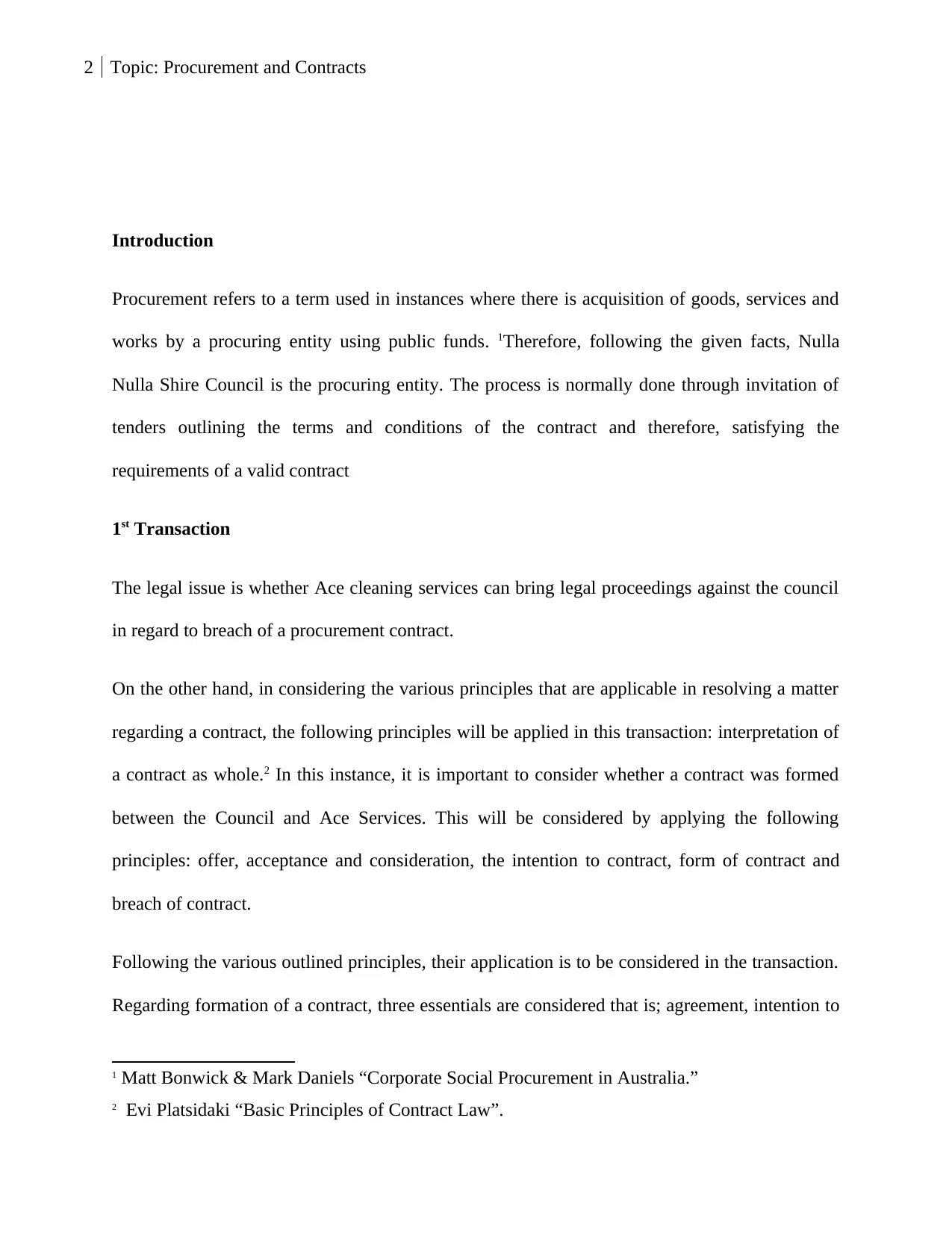
2 Topic: Procurement and Contracts
Introduction
Procurement refers to a term used in instances where there is acquisition of goods, services and
works by a procuring entity using public funds. 1Therefore, following the given facts, Nulla
Nulla Shire Council is the procuring entity. The process is normally done through invitation of
tenders outlining the terms and conditions of the contract and therefore, satisfying the
requirements of a valid contract
1st Transaction
The legal issue is whether Ace cleaning services can bring legal proceedings against the council
in regard to breach of a procurement contract.
On the other hand, in considering the various principles that are applicable in resolving a matter
regarding a contract, the following principles will be applied in this transaction: interpretation of
a contract as whole.2 In this instance, it is important to consider whether a contract was formed
between the Council and Ace Services. This will be considered by applying the following
principles: offer, acceptance and consideration, the intention to contract, form of contract and
breach of contract.
Following the various outlined principles, their application is to be considered in the transaction.
Regarding formation of a contract, three essentials are considered that is; agreement, intention to
1 Matt Bonwick & Mark Daniels “Corporate Social Procurement in Australia.”
2 Evi Platsidaki “Basic Principles of Contract Law”.
Introduction
Procurement refers to a term used in instances where there is acquisition of goods, services and
works by a procuring entity using public funds. 1Therefore, following the given facts, Nulla
Nulla Shire Council is the procuring entity. The process is normally done through invitation of
tenders outlining the terms and conditions of the contract and therefore, satisfying the
requirements of a valid contract
1st Transaction
The legal issue is whether Ace cleaning services can bring legal proceedings against the council
in regard to breach of a procurement contract.
On the other hand, in considering the various principles that are applicable in resolving a matter
regarding a contract, the following principles will be applied in this transaction: interpretation of
a contract as whole.2 In this instance, it is important to consider whether a contract was formed
between the Council and Ace Services. This will be considered by applying the following
principles: offer, acceptance and consideration, the intention to contract, form of contract and
breach of contract.
Following the various outlined principles, their application is to be considered in the transaction.
Regarding formation of a contract, three essentials are considered that is; agreement, intention to
1 Matt Bonwick & Mark Daniels “Corporate Social Procurement in Australia.”
2 Evi Platsidaki “Basic Principles of Contract Law”.
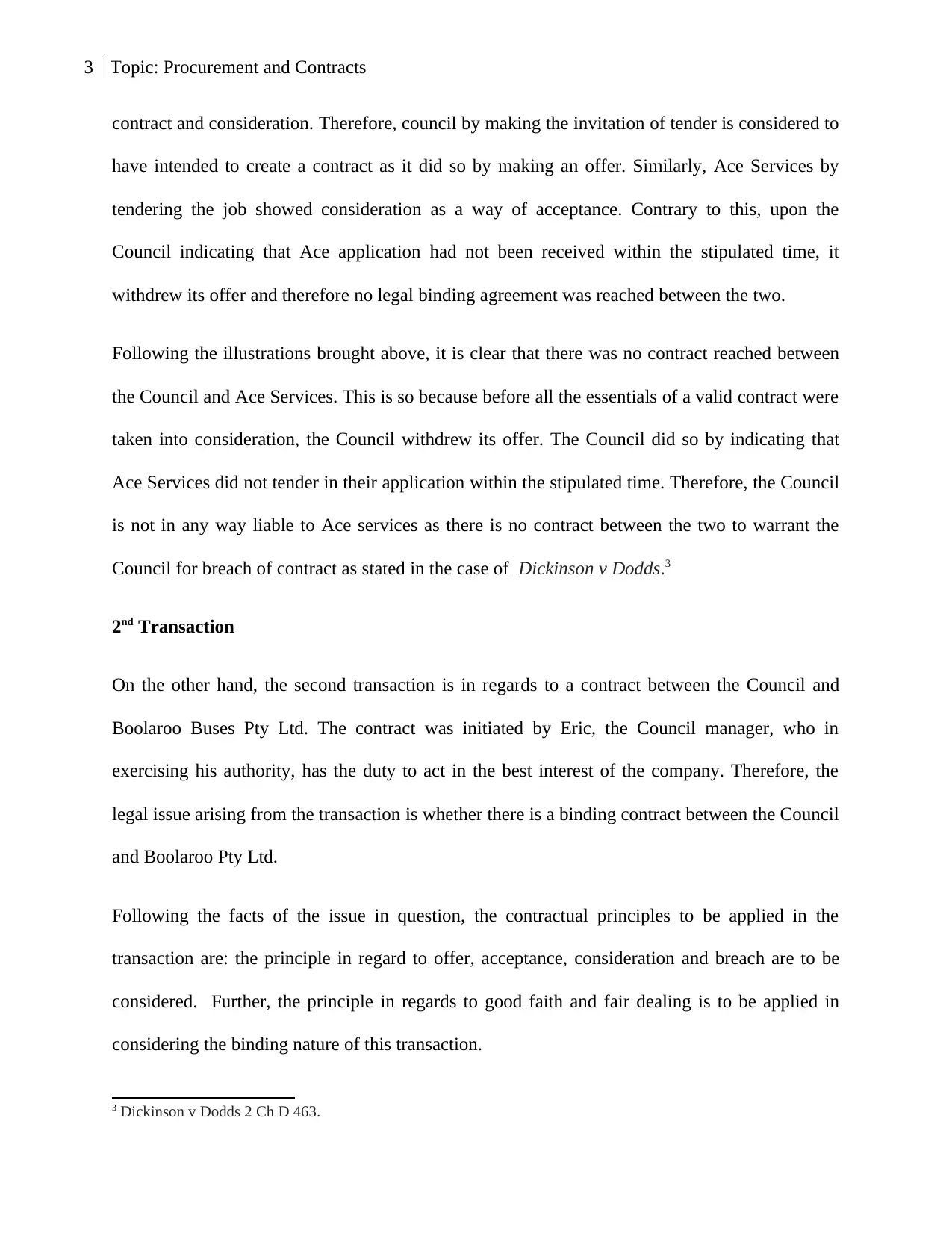
3 Topic: Procurement and Contracts
contract and consideration. Therefore, council by making the invitation of tender is considered to
have intended to create a contract as it did so by making an offer. Similarly, Ace Services by
tendering the job showed consideration as a way of acceptance. Contrary to this, upon the
Council indicating that Ace application had not been received within the stipulated time, it
withdrew its offer and therefore no legal binding agreement was reached between the two.
Following the illustrations brought above, it is clear that there was no contract reached between
the Council and Ace Services. This is so because before all the essentials of a valid contract were
taken into consideration, the Council withdrew its offer. The Council did so by indicating that
Ace Services did not tender in their application within the stipulated time. Therefore, the Council
is not in any way liable to Ace services as there is no contract between the two to warrant the
Council for breach of contract as stated in the case of Dickinson v Dodds.3
2nd Transaction
On the other hand, the second transaction is in regards to a contract between the Council and
Boolaroo Buses Pty Ltd. The contract was initiated by Eric, the Council manager, who in
exercising his authority, has the duty to act in the best interest of the company. Therefore, the
legal issue arising from the transaction is whether there is a binding contract between the Council
and Boolaroo Pty Ltd.
Following the facts of the issue in question, the contractual principles to be applied in the
transaction are: the principle in regard to offer, acceptance, consideration and breach are to be
considered. Further, the principle in regards to good faith and fair dealing is to be applied in
considering the binding nature of this transaction.
3 Dickinson v Dodds 2 Ch D 463.
contract and consideration. Therefore, council by making the invitation of tender is considered to
have intended to create a contract as it did so by making an offer. Similarly, Ace Services by
tendering the job showed consideration as a way of acceptance. Contrary to this, upon the
Council indicating that Ace application had not been received within the stipulated time, it
withdrew its offer and therefore no legal binding agreement was reached between the two.
Following the illustrations brought above, it is clear that there was no contract reached between
the Council and Ace Services. This is so because before all the essentials of a valid contract were
taken into consideration, the Council withdrew its offer. The Council did so by indicating that
Ace Services did not tender in their application within the stipulated time. Therefore, the Council
is not in any way liable to Ace services as there is no contract between the two to warrant the
Council for breach of contract as stated in the case of Dickinson v Dodds.3
2nd Transaction
On the other hand, the second transaction is in regards to a contract between the Council and
Boolaroo Buses Pty Ltd. The contract was initiated by Eric, the Council manager, who in
exercising his authority, has the duty to act in the best interest of the company. Therefore, the
legal issue arising from the transaction is whether there is a binding contract between the Council
and Boolaroo Pty Ltd.
Following the facts of the issue in question, the contractual principles to be applied in the
transaction are: the principle in regard to offer, acceptance, consideration and breach are to be
considered. Further, the principle in regards to good faith and fair dealing is to be applied in
considering the binding nature of this transaction.
3 Dickinson v Dodds 2 Ch D 463.
⊘ This is a preview!⊘
Do you want full access?
Subscribe today to unlock all pages.

Trusted by 1+ million students worldwide
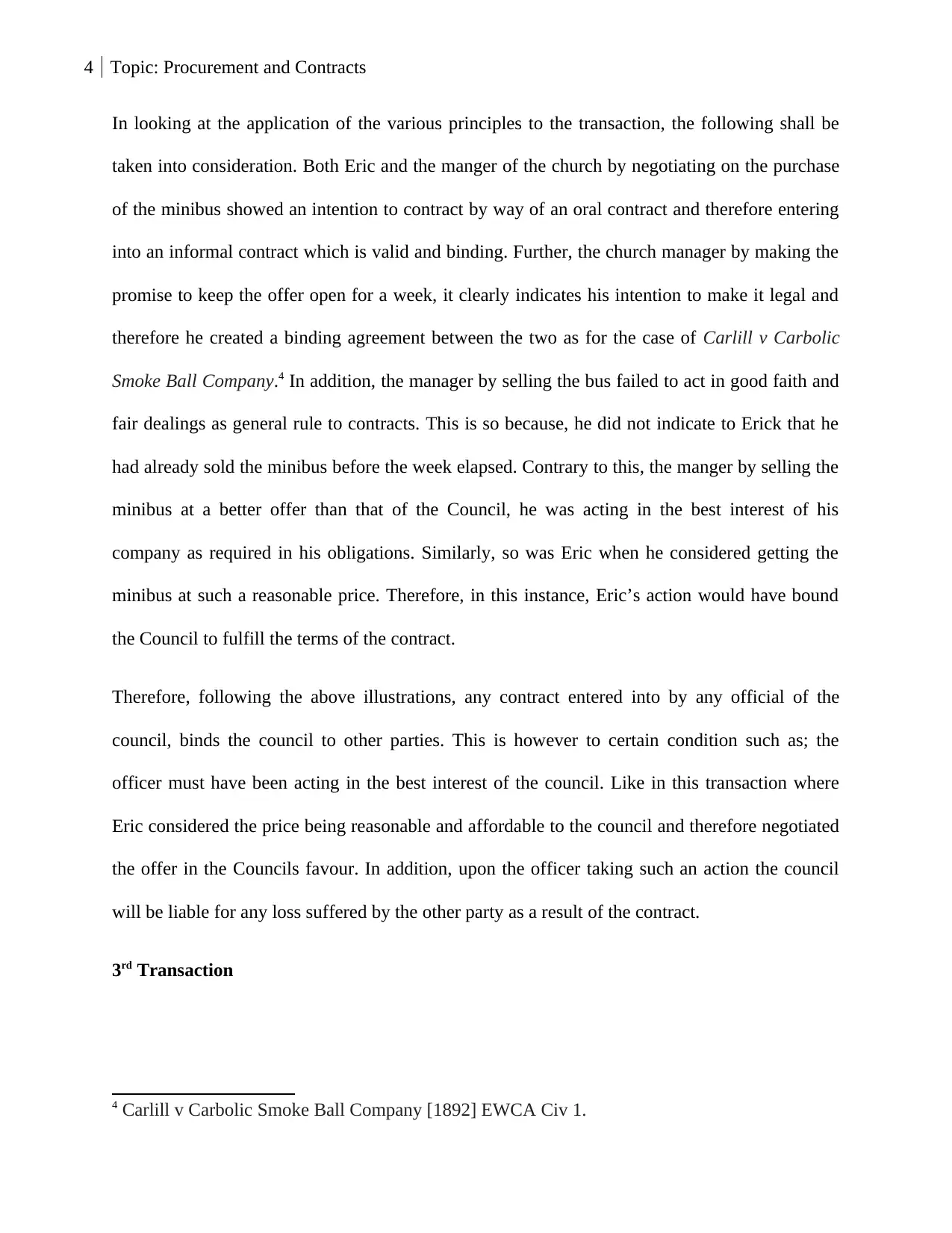
4 Topic: Procurement and Contracts
In looking at the application of the various principles to the transaction, the following shall be
taken into consideration. Both Eric and the manger of the church by negotiating on the purchase
of the minibus showed an intention to contract by way of an oral contract and therefore entering
into an informal contract which is valid and binding. Further, the church manager by making the
promise to keep the offer open for a week, it clearly indicates his intention to make it legal and
therefore he created a binding agreement between the two as for the case of Carlill v Carbolic
Smoke Ball Company.4 In addition, the manager by selling the bus failed to act in good faith and
fair dealings as general rule to contracts. This is so because, he did not indicate to Erick that he
had already sold the minibus before the week elapsed. Contrary to this, the manger by selling the
minibus at a better offer than that of the Council, he was acting in the best interest of his
company as required in his obligations. Similarly, so was Eric when he considered getting the
minibus at such a reasonable price. Therefore, in this instance, Eric’s action would have bound
the Council to fulfill the terms of the contract.
Therefore, following the above illustrations, any contract entered into by any official of the
council, binds the council to other parties. This is however to certain condition such as; the
officer must have been acting in the best interest of the council. Like in this transaction where
Eric considered the price being reasonable and affordable to the council and therefore negotiated
the offer in the Councils favour. In addition, upon the officer taking such an action the council
will be liable for any loss suffered by the other party as a result of the contract.
3rd Transaction
4 Carlill v Carbolic Smoke Ball Company [1892] EWCA Civ 1.
In looking at the application of the various principles to the transaction, the following shall be
taken into consideration. Both Eric and the manger of the church by negotiating on the purchase
of the minibus showed an intention to contract by way of an oral contract and therefore entering
into an informal contract which is valid and binding. Further, the church manager by making the
promise to keep the offer open for a week, it clearly indicates his intention to make it legal and
therefore he created a binding agreement between the two as for the case of Carlill v Carbolic
Smoke Ball Company.4 In addition, the manager by selling the bus failed to act in good faith and
fair dealings as general rule to contracts. This is so because, he did not indicate to Erick that he
had already sold the minibus before the week elapsed. Contrary to this, the manger by selling the
minibus at a better offer than that of the Council, he was acting in the best interest of his
company as required in his obligations. Similarly, so was Eric when he considered getting the
minibus at such a reasonable price. Therefore, in this instance, Eric’s action would have bound
the Council to fulfill the terms of the contract.
Therefore, following the above illustrations, any contract entered into by any official of the
council, binds the council to other parties. This is however to certain condition such as; the
officer must have been acting in the best interest of the council. Like in this transaction where
Eric considered the price being reasonable and affordable to the council and therefore negotiated
the offer in the Councils favour. In addition, upon the officer taking such an action the council
will be liable for any loss suffered by the other party as a result of the contract.
3rd Transaction
4 Carlill v Carbolic Smoke Ball Company [1892] EWCA Civ 1.
Paraphrase This Document
Need a fresh take? Get an instant paraphrase of this document with our AI Paraphraser
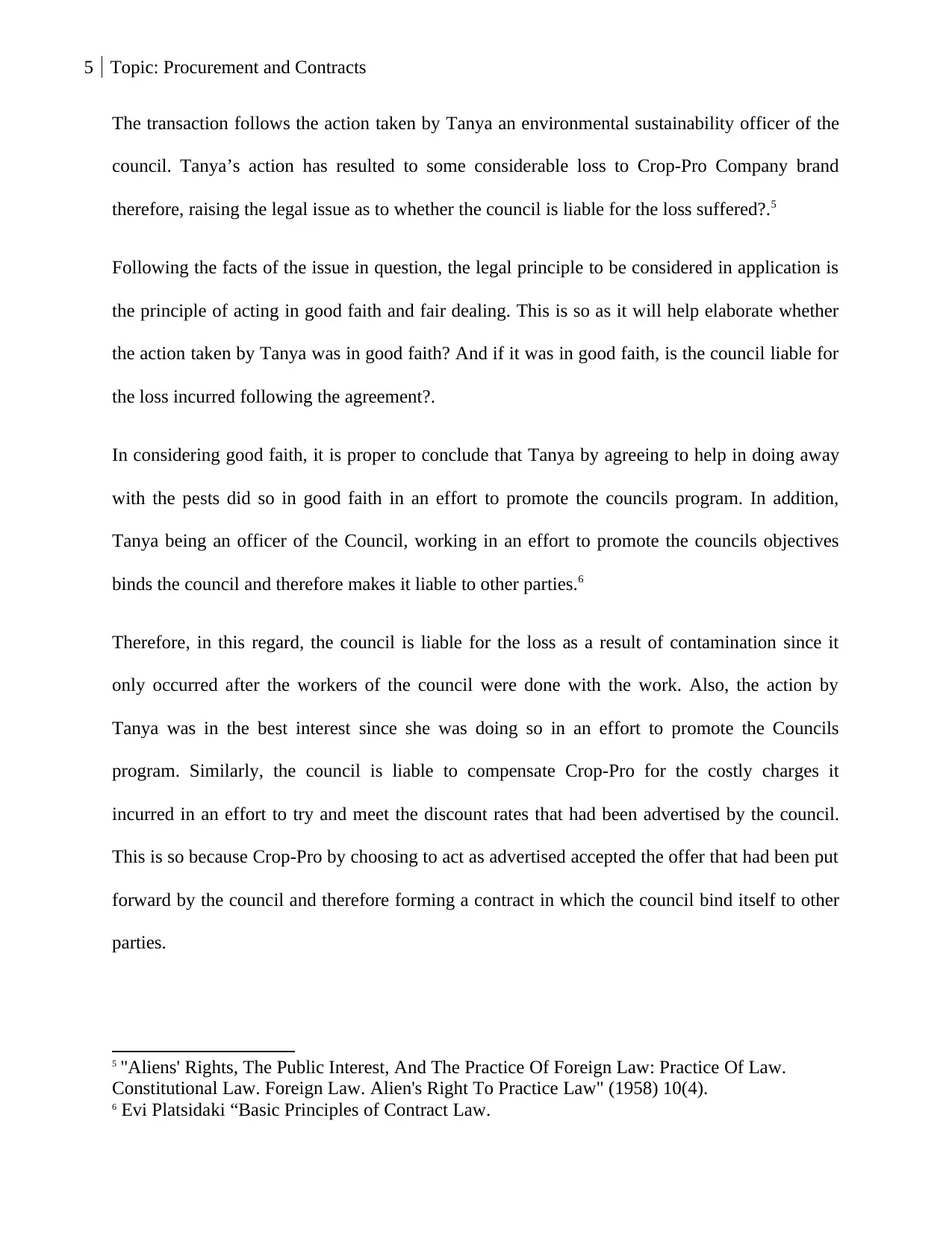
5 Topic: Procurement and Contracts
The transaction follows the action taken by Tanya an environmental sustainability officer of the
council. Tanya’s action has resulted to some considerable loss to Crop-Pro Company brand
therefore, raising the legal issue as to whether the council is liable for the loss suffered?.5
Following the facts of the issue in question, the legal principle to be considered in application is
the principle of acting in good faith and fair dealing. This is so as it will help elaborate whether
the action taken by Tanya was in good faith? And if it was in good faith, is the council liable for
the loss incurred following the agreement?.
In considering good faith, it is proper to conclude that Tanya by agreeing to help in doing away
with the pests did so in good faith in an effort to promote the councils program. In addition,
Tanya being an officer of the Council, working in an effort to promote the councils objectives
binds the council and therefore makes it liable to other parties.6
Therefore, in this regard, the council is liable for the loss as a result of contamination since it
only occurred after the workers of the council were done with the work. Also, the action by
Tanya was in the best interest since she was doing so in an effort to promote the Councils
program. Similarly, the council is liable to compensate Crop-Pro for the costly charges it
incurred in an effort to try and meet the discount rates that had been advertised by the council.
This is so because Crop-Pro by choosing to act as advertised accepted the offer that had been put
forward by the council and therefore forming a contract in which the council bind itself to other
parties.
5 "Aliens' Rights, The Public Interest, And The Practice Of Foreign Law: Practice Of Law.
Constitutional Law. Foreign Law. Alien's Right To Practice Law" (1958) 10(4).
6 Evi Platsidaki “Basic Principles of Contract Law.
The transaction follows the action taken by Tanya an environmental sustainability officer of the
council. Tanya’s action has resulted to some considerable loss to Crop-Pro Company brand
therefore, raising the legal issue as to whether the council is liable for the loss suffered?.5
Following the facts of the issue in question, the legal principle to be considered in application is
the principle of acting in good faith and fair dealing. This is so as it will help elaborate whether
the action taken by Tanya was in good faith? And if it was in good faith, is the council liable for
the loss incurred following the agreement?.
In considering good faith, it is proper to conclude that Tanya by agreeing to help in doing away
with the pests did so in good faith in an effort to promote the councils program. In addition,
Tanya being an officer of the Council, working in an effort to promote the councils objectives
binds the council and therefore makes it liable to other parties.6
Therefore, in this regard, the council is liable for the loss as a result of contamination since it
only occurred after the workers of the council were done with the work. Also, the action by
Tanya was in the best interest since she was doing so in an effort to promote the Councils
program. Similarly, the council is liable to compensate Crop-Pro for the costly charges it
incurred in an effort to try and meet the discount rates that had been advertised by the council.
This is so because Crop-Pro by choosing to act as advertised accepted the offer that had been put
forward by the council and therefore forming a contract in which the council bind itself to other
parties.
5 "Aliens' Rights, The Public Interest, And The Practice Of Foreign Law: Practice Of Law.
Constitutional Law. Foreign Law. Alien's Right To Practice Law" (1958) 10(4).
6 Evi Platsidaki “Basic Principles of Contract Law.
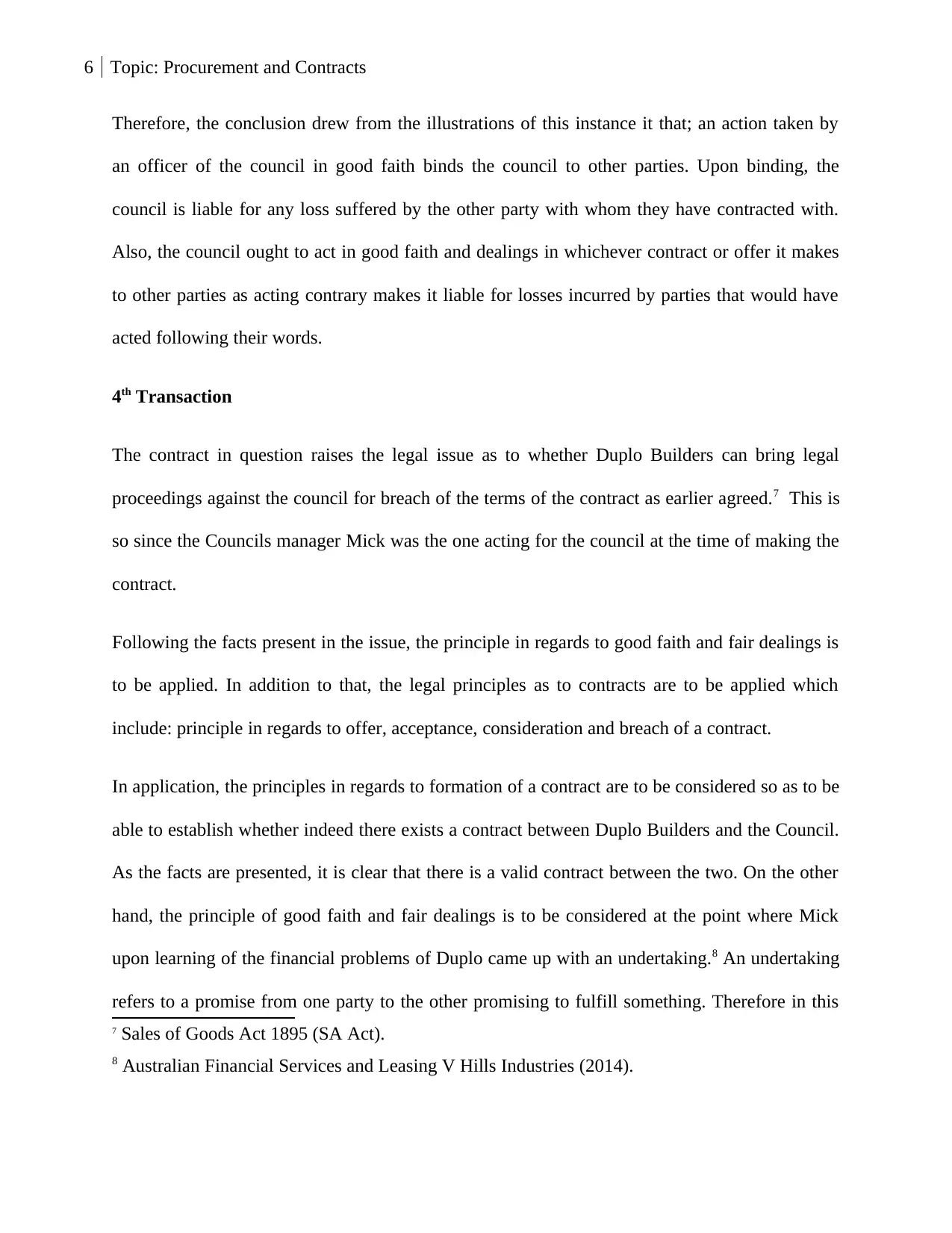
6 Topic: Procurement and Contracts
Therefore, the conclusion drew from the illustrations of this instance it that; an action taken by
an officer of the council in good faith binds the council to other parties. Upon binding, the
council is liable for any loss suffered by the other party with whom they have contracted with.
Also, the council ought to act in good faith and dealings in whichever contract or offer it makes
to other parties as acting contrary makes it liable for losses incurred by parties that would have
acted following their words.
4th Transaction
The contract in question raises the legal issue as to whether Duplo Builders can bring legal
proceedings against the council for breach of the terms of the contract as earlier agreed.7 This is
so since the Councils manager Mick was the one acting for the council at the time of making the
contract.
Following the facts present in the issue, the principle in regards to good faith and fair dealings is
to be applied. In addition to that, the legal principles as to contracts are to be applied which
include: principle in regards to offer, acceptance, consideration and breach of a contract.
In application, the principles in regards to formation of a contract are to be considered so as to be
able to establish whether indeed there exists a contract between Duplo Builders and the Council.
As the facts are presented, it is clear that there is a valid contract between the two. On the other
hand, the principle of good faith and fair dealings is to be considered at the point where Mick
upon learning of the financial problems of Duplo came up with an undertaking.8 An undertaking
refers to a promise from one party to the other promising to fulfill something. Therefore in this
7 Sales of Goods Act 1895 (SA Act).
8 Australian Financial Services and Leasing V Hills Industries (2014).
Therefore, the conclusion drew from the illustrations of this instance it that; an action taken by
an officer of the council in good faith binds the council to other parties. Upon binding, the
council is liable for any loss suffered by the other party with whom they have contracted with.
Also, the council ought to act in good faith and dealings in whichever contract or offer it makes
to other parties as acting contrary makes it liable for losses incurred by parties that would have
acted following their words.
4th Transaction
The contract in question raises the legal issue as to whether Duplo Builders can bring legal
proceedings against the council for breach of the terms of the contract as earlier agreed.7 This is
so since the Councils manager Mick was the one acting for the council at the time of making the
contract.
Following the facts present in the issue, the principle in regards to good faith and fair dealings is
to be applied. In addition to that, the legal principles as to contracts are to be applied which
include: principle in regards to offer, acceptance, consideration and breach of a contract.
In application, the principles in regards to formation of a contract are to be considered so as to be
able to establish whether indeed there exists a contract between Duplo Builders and the Council.
As the facts are presented, it is clear that there is a valid contract between the two. On the other
hand, the principle of good faith and fair dealings is to be considered at the point where Mick
upon learning of the financial problems of Duplo came up with an undertaking.8 An undertaking
refers to a promise from one party to the other promising to fulfill something. Therefore in this
7 Sales of Goods Act 1895 (SA Act).
8 Australian Financial Services and Leasing V Hills Industries (2014).
⊘ This is a preview!⊘
Do you want full access?
Subscribe today to unlock all pages.

Trusted by 1+ million students worldwide
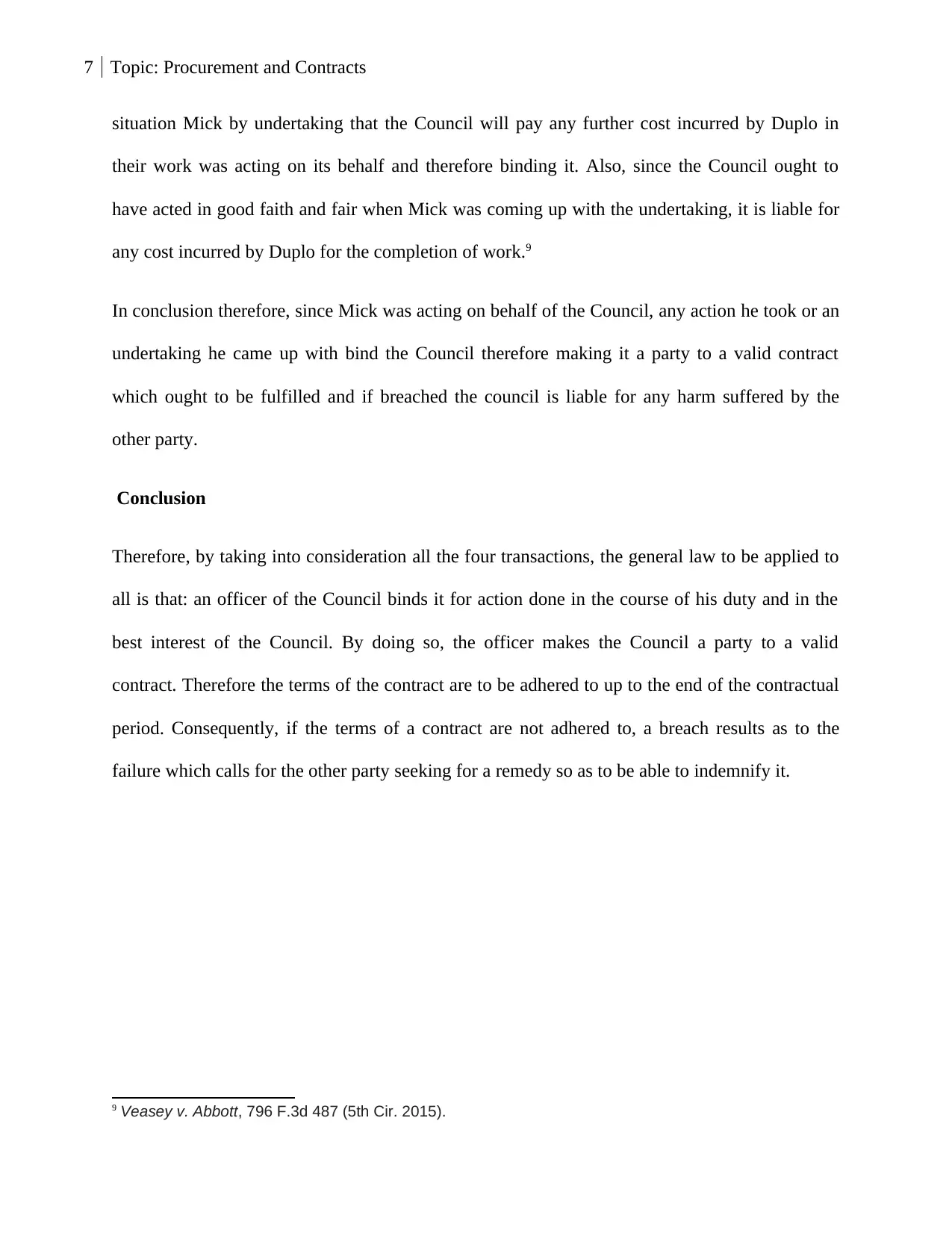
7 Topic: Procurement and Contracts
situation Mick by undertaking that the Council will pay any further cost incurred by Duplo in
their work was acting on its behalf and therefore binding it. Also, since the Council ought to
have acted in good faith and fair when Mick was coming up with the undertaking, it is liable for
any cost incurred by Duplo for the completion of work.9
In conclusion therefore, since Mick was acting on behalf of the Council, any action he took or an
undertaking he came up with bind the Council therefore making it a party to a valid contract
which ought to be fulfilled and if breached the council is liable for any harm suffered by the
other party.
Conclusion
Therefore, by taking into consideration all the four transactions, the general law to be applied to
all is that: an officer of the Council binds it for action done in the course of his duty and in the
best interest of the Council. By doing so, the officer makes the Council a party to a valid
contract. Therefore the terms of the contract are to be adhered to up to the end of the contractual
period. Consequently, if the terms of a contract are not adhered to, a breach results as to the
failure which calls for the other party seeking for a remedy so as to be able to indemnify it.
9 Veasey v. Abbott, 796 F.3d 487 (5th Cir. 2015).
situation Mick by undertaking that the Council will pay any further cost incurred by Duplo in
their work was acting on its behalf and therefore binding it. Also, since the Council ought to
have acted in good faith and fair when Mick was coming up with the undertaking, it is liable for
any cost incurred by Duplo for the completion of work.9
In conclusion therefore, since Mick was acting on behalf of the Council, any action he took or an
undertaking he came up with bind the Council therefore making it a party to a valid contract
which ought to be fulfilled and if breached the council is liable for any harm suffered by the
other party.
Conclusion
Therefore, by taking into consideration all the four transactions, the general law to be applied to
all is that: an officer of the Council binds it for action done in the course of his duty and in the
best interest of the Council. By doing so, the officer makes the Council a party to a valid
contract. Therefore the terms of the contract are to be adhered to up to the end of the contractual
period. Consequently, if the terms of a contract are not adhered to, a breach results as to the
failure which calls for the other party seeking for a remedy so as to be able to indemnify it.
9 Veasey v. Abbott, 796 F.3d 487 (5th Cir. 2015).
Paraphrase This Document
Need a fresh take? Get an instant paraphrase of this document with our AI Paraphraser
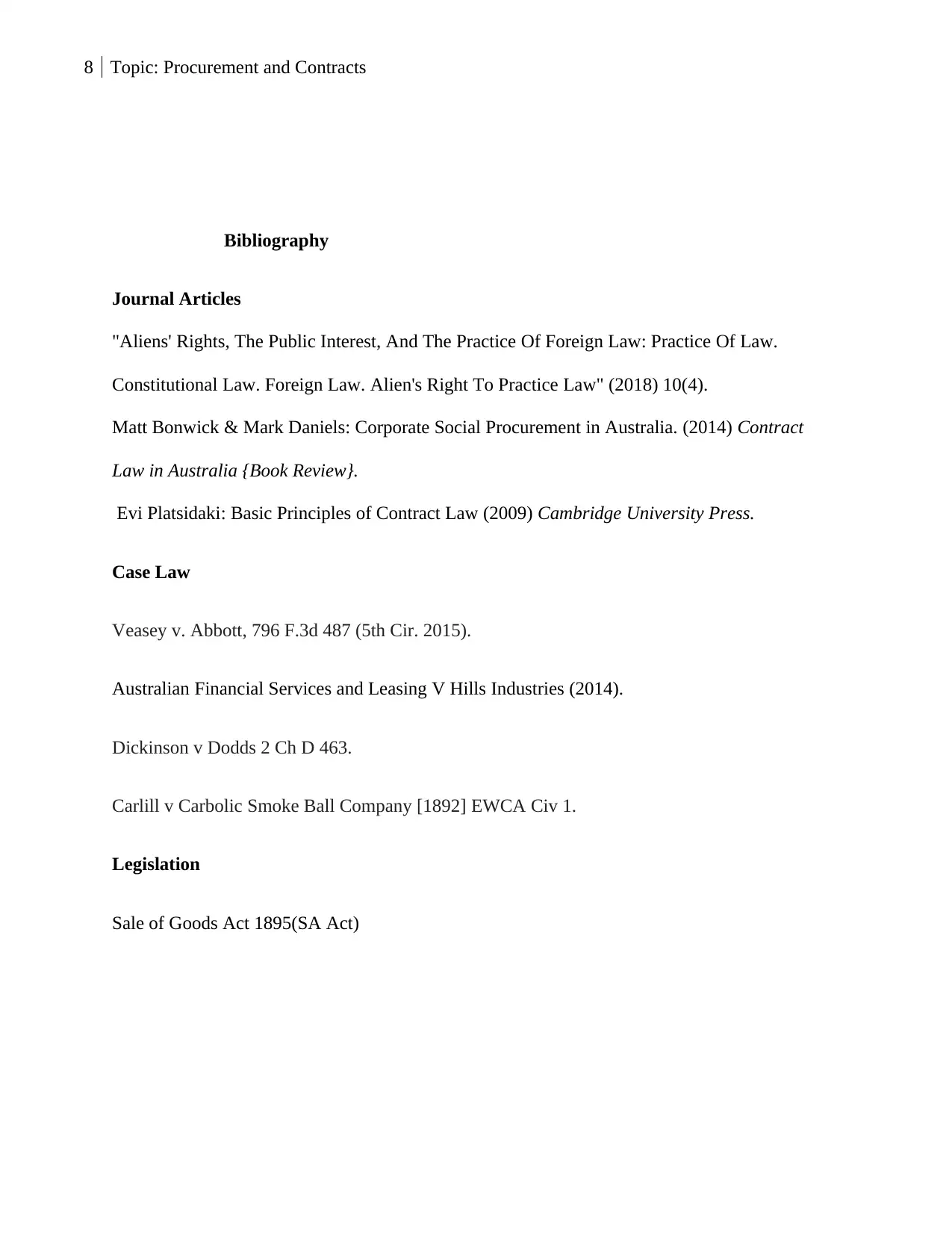
8 Topic: Procurement and Contracts
Bibliography
Journal Articles
"Aliens' Rights, The Public Interest, And The Practice Of Foreign Law: Practice Of Law.
Constitutional Law. Foreign Law. Alien's Right To Practice Law" (2018) 10(4).
Matt Bonwick & Mark Daniels: Corporate Social Procurement in Australia. (2014) Contract
Law in Australia {Book Review}.
Evi Platsidaki: Basic Principles of Contract Law (2009) Cambridge University Press.
Case Law
Veasey v. Abbott, 796 F.3d 487 (5th Cir. 2015).
Australian Financial Services and Leasing V Hills Industries (2014).
Dickinson v Dodds 2 Ch D 463.
Carlill v Carbolic Smoke Ball Company [1892] EWCA Civ 1.
Legislation
Sale of Goods Act 1895(SA Act)
Bibliography
Journal Articles
"Aliens' Rights, The Public Interest, And The Practice Of Foreign Law: Practice Of Law.
Constitutional Law. Foreign Law. Alien's Right To Practice Law" (2018) 10(4).
Matt Bonwick & Mark Daniels: Corporate Social Procurement in Australia. (2014) Contract
Law in Australia {Book Review}.
Evi Platsidaki: Basic Principles of Contract Law (2009) Cambridge University Press.
Case Law
Veasey v. Abbott, 796 F.3d 487 (5th Cir. 2015).
Australian Financial Services and Leasing V Hills Industries (2014).
Dickinson v Dodds 2 Ch D 463.
Carlill v Carbolic Smoke Ball Company [1892] EWCA Civ 1.
Legislation
Sale of Goods Act 1895(SA Act)
1 out of 8
Related Documents
Your All-in-One AI-Powered Toolkit for Academic Success.
+13062052269
info@desklib.com
Available 24*7 on WhatsApp / Email
![[object Object]](/_next/static/media/star-bottom.7253800d.svg)
Unlock your academic potential
Copyright © 2020–2025 A2Z Services. All Rights Reserved. Developed and managed by ZUCOL.





